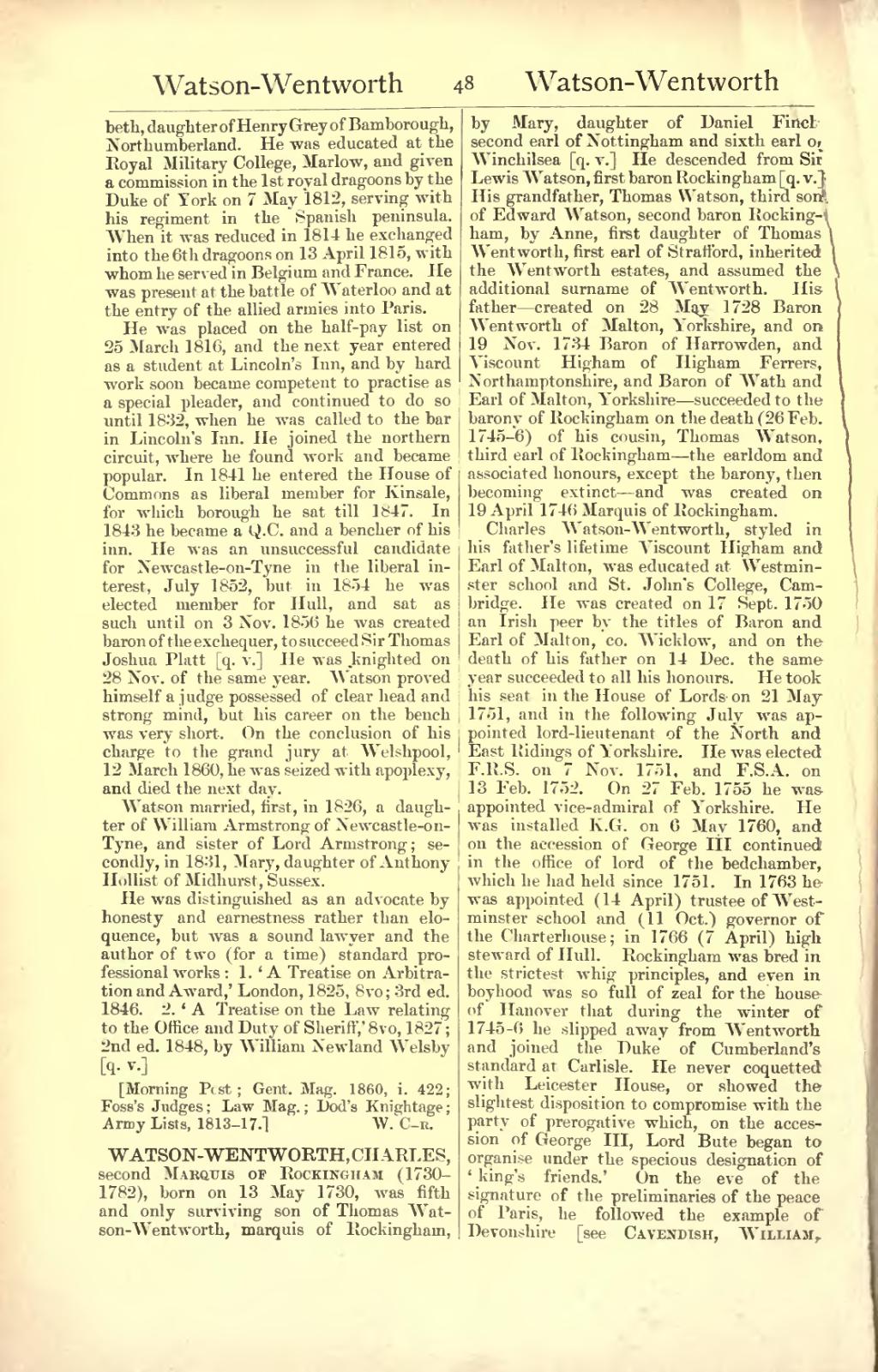beth, daughter of Henry Grey of Bamborough, Northumberland. He was educated at the Royal Military College, Marlow, and given a commission in the 1st royal dragoons by the Duke of York on 7 May 1812, serving with his regiment in the Spanish peninsula. When it was reduced in 1814 he exchanged into the 6th dragoons on 13 April 1815, with whom he served in Belgium and France. He was present at the battle of Waterloo and at the entry of the allied armies into Paris.
He was placed on the half-pay list on 25 March 1816, and the next year entered as a student at Lincoln's Inn, and by hard work soon became competent to practise as a special pleader, and continued to do so until 1832, when he was called to the bar in Lincoln's Inn. He joined the northern circuit, where he found work and became popular. In 1841 he entered the House of Commons as liberal member for Kinsale, for which borough he sat till 1847. In 1843 he became a Q.C. and a bencher of his inn. He was an unsuccessful candidate for Newcastle-on-Tyne in the liberal interest, July 1852, but in 1854 he was elected member for Hull, and sat as such until on 3 Nov. 1856 he was created baron of the exchequer, to succeed Sir Thomas Joshua Platt [q. v.] He was knighted on 28 Nov. of the same year. Watson proved himself a judge possessed of clear head and strong mind, but his career on the bench was very short. On the conclusion of his charge to the grand jury at Welshpool, 12 March 1860, he was seized with apoplexy, and died the next day.
Watson married, first, in 1826, a daughter of William Armstrong of Newcastle-on-Tyne, and sister of Lord Armstrong; secondly, in 1831, Mary, daughter of Anthony Hollist of Midhurst, Sussex.
He was distinguished as an advocate by honesty and earnestness rather than eloquence, but was a sound lawyer and the author of two (for a time) standard professional works:
- ‘A Treatise on Arbitration and Award,’ London, 1825, 8vo; 3rd ed. 1846.
- ‘A Treatise on the Law relating to the Office and Duty of Sheriff,’ 8vo, 1827; 2nd ed. 1848, by William Newland Welsby [q. v.]
[Morning Post; Gent. Mag. 1860, i. 422; Foss's Judges; Law Mag.; Dod's Knightage; Army Lists, 1813–17.]
WATSON-WENTWORTH, CHARLES, second Marquis of Rockingham (1730–1782), born on 13 May 1730, was fifth and only surviving son of Thomas Watson-Wentworth, marquis of Rockingham, by Mary, daughter of Daniel Finch, second earl of Nottingham and sixth earl of Winchilsea [q. v.] He descended from Sir Lewis Watson, first baron Rockingham [q. v.] His grandfather, Thomas Watson, third son of Edward Watson, second baron Rockingham, by Anne, first daughter of Thomas Wentworth, first earl of Strafford, inherited the Wentworth estates, and assumed the additional surname of Wentworth. His father—created on 28 May 1728 Baron Wentworth of Malton, Yorkshire, and on 19 Nov. 1734 Baron of Harrowden, and Viscount Higham of Higham Ferrers, Northamptonshire, and Baron of Wath and Earl of Malton, Yorkshire—succeeded to the barony of Rockingham on the death (26 Feb. 1745–6) of his cousin, Thomas Watson, third earl of Rockingham—the earldom and associated honours, except the barony, then becoming extinct—and was created on 19 April 1746 Marquis of Rockingham.
Charles Watson-Wentworth, styled in his father's lifetime Viscount Higham and Earl of Malton, was educated at Westminster school and St. John's College, Cambridge. He was created on 17 Sept. 1750 an Irish peer by the titles of Baron and Earl of Malton, co. Wicklow, and on the death of his father on 14 Dec. the same year succeeded to all his honours. He took his seat in the House of Lords on 21 May 1751, and in the following July was appointed lord-lieutenant of the North and East Ridings of Yorkshire. He was elected F.R.S. on 7 Nov. 1751, and F.S.A. on 13 Feb. 1752. On 27 Feb. 1755 he was appointed vice-admiral of Yorkshire. He was installed K.G. on 6 May 1760, and on the accession of George III continued in the office of lord of the bedchamber, which he had held since 1751. In 1763 he was appointed (14 April) trustee of Westminster school and (11 Oct.) governor of the Charterhouse; in 1766 (7 April) high steward of Hull. Rockingham was bred in the strictest whig principles, and even in boyhood was so full of zeal for the house of Hanover that during the winter of 1745–6 he slipped away from Wentworth and joined the Duke of Cumberland's standard at Carlisle. He never coquetted with Leicester House, or showed the slightest disposition to compromise with the party of prerogative which, on the accession of George III, Lord Bute began to organise under the specious designation of ‘king's friends.’ On the eve of the signature of the preliminaries of the peace of Paris, he followed the example of Devonshire [see Cavendish, William,
